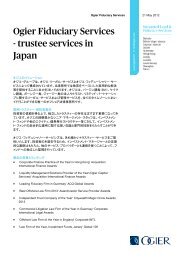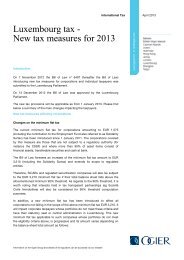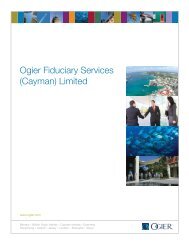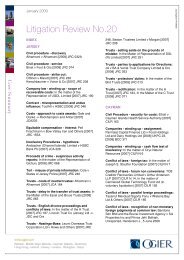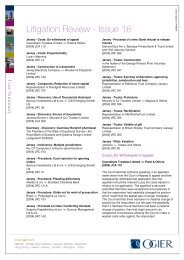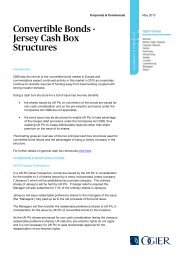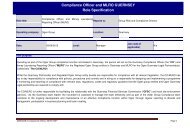Litigation Review - No. 19 - Ogier
Litigation Review - No. 19 - Ogier
Litigation Review - No. 19 - Ogier
Create successful ePaper yourself
Turn your PDF publications into a flip-book with our unique Google optimized e-Paper software.
April 2008<strong>Litigation</strong> <strong>Review</strong> - <strong>No</strong>. <strong>19</strong>Case SummaryCompanies - Reduction of Share CapitalIn the matter of the Representation ofHenderson Far East Income Limited [2007]JRC 015A closed end collective investment fund company soughtto reduce its share capital pursuant to Articles 62 and 63of the Companies (Jersey) Law <strong>19</strong>91. The court held thatit had a discretion as to whether to approve a reduction ofcapital approved by the shareholders by specialresolution and in considering its decision it had to look atthe interests of the shareholders (to ensure that they havebeen treated equitably, the proposals have been properlyexplained to them and that the reduction has adiscernable purpose).The purpose of the reduction was twofold. The firstpurpose was to ensure the company’s ability to pay aquarterly dividend even if capital or other losses wereaccrued in the future which would otherwise prevent itspayment. The second was to ensure that if its shareswere traded at a discount to their net asset value (asoften happens with closed ended investment companies),the company could effect a buy-back of its shares fromtime to time (funded out of distributable profits) in order toameliorate the discount position. The issue of no parvalue shares would be followed by an immediatereduction of capital to enable distributions to be madefollowed by an issue of shares to the public. The courtwas satisfied that there was a discernible purpose andthat the proposals for the reduction had been properlyexplained in the prospectus, but it emphasised the needfor companies to explain in simple lay terms why thereduction is thought to be a good idea for shareholders.As far as the interests of the creditors were concerned,they were protected by the retention by the company of asum of money which would not be distributed until afterthey had been paid in full. The court therefore approvedthe reduction of capital.was therefore justified - in accordance with the principlesset out in Allied Maples Group Ltd v Simmons & Simmons[<strong>19</strong>95] 1 WLR 1602 -in applying a discount to reflect thatuncertainty.Costs - contempt of courtPlay Ltd v Legato Assets Ltd [2006] JRC144The important point which emerges from this case is thatwhere a defendant breaches an interim injunction so as tocommit a contempt of court, he will be ordered to payindemnity costs even if the breach was inadvertent. Themain reason for this is that a plaintiff should not be left outof pocket in seeking to obtain enforcement of the relief hehad already been granted by the Court.Costs - position of public bodiesJFSC v AP Black & Ors [2006] JRC 182Commissioner Page was faced with an argument thatfollowing the strike-out of proceedings brought by theJFSC against one of the defendants, she should bear herown costs.He reviewed the relevant English authorities and held thathe was not prepared to follow authority to the effect thatbodies engaged in performing public interest functionsmust in all cases take their chance on costs, just like anyother litigant, stating that such a rigid position was at oddswith the general approach of the Royal Court to theexercise of discretion in matter of costs. The fact that theunsuccessful or discontinuing party has been engaged inthe proceedings in furtherance of its public interestfunction was a relevant factor but should be treated asonly one element relevant to the court’s exercise ofdiscretion. The body’s status should not be treated asautomatically giving rise to any rule that it should not paycosts.Contract - discounted damagesSnell v Beadle [2006] JCA 164This case concerned Mr. Snell’s appeal against the RoyalCourt’s decision on the quantum of his damages forbreach of contract. The contract comprised anagreement between himself and Mrs. Beadle that hewould have a right of way across her land, from whichshe subsequently resiled.The Court of Appeal upheld the Royal Court’s decision toapply a 25% discount to the recoverable damagesbecause Mr. Snell’s ability to develop two properties(which he alleged he would have done, had Mrs. Beadleupheld her end of the agreement) would have beendependent on funding provided by others. His loss,therefore, depended upon the hypothetical act of a thirdparty. The Royal Court thought that funding wouldprobably have been available but was not sure, and itThe correct approach is to consider both: (i) the financialprejudice to the particular complainant if an order forcosts is not made in his favour; and (ii) the need toencourage public authorities to make and stand by honestand reasonable decisions without fear of exposure toundue prejudice if the decision is successfully challenged.Taking these factors into account, he found that thedefendant’s unwillingness to verify her means by affidavitfor the purposes of claiming legal aid counted against her(had she done so, the JFSC would probably havedropped the proceedings against her) and ordered thatshe should bear her own costs. He also ordered that theJFSC could discontinue the proceedings with no furtherorder as to costs.ADMIN-14369297-2



